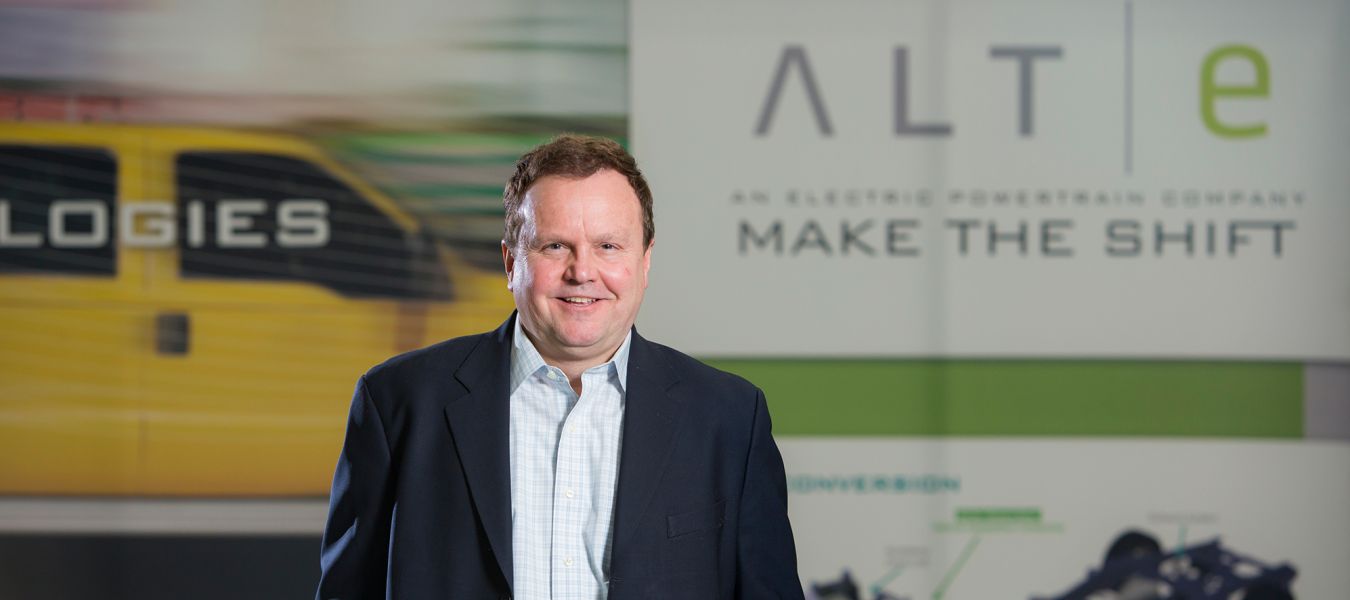
T'86
Tony Posawatz
President & CEO, Invictus iCAR LLC
When a problem is staring you in the eye, the best thing to do is stare back and deal with it. It is exciting to work on solutions for the future. After all, my children and generations to come will be spending the rest of their lives there.
Tony Posawatz T’86 is a car guy. The love affair started long before he got his driver’s license—he is from Detroit—but it is still best explained by the independence that four wheels granted him.
“When I was 16, a car was a ticket to freedom,” he says. “It’s how I went places and met people.”
In the United States, stories like Posawatz’s are as ubiquitous as the cars that animate them. For every 100 Americans, there are roughly 80 automobiles—a higher rate of car ownership than anywhere else in the world. In China, the figure is 10 times lower but catching up fast (they, too, seek the freedom of mobility). It took the world more than 100 years to reach one billion automobiles; the next billion, owing to a growing middle class in developing nations, could tick by in just 25 years.
The trend presents a tough question: what will power all those new cars? There isn’t enough oil in the world to do it. Even if there was, the cost of gasoline would skyrocket and the environmental impacts of the greenhouse gas emissions would likely be catastrophic.
For Posawatz, this was more than an interesting problem; it was a huge business opportunity. From the late-1990s until 2005, Posawatz was the vehicle line director for GM’s full-size trucks, which had become a Fortune 20 business. In 2006, Bob Lutz, GM’s vice chairman, asked Posawatz to lead the company’s next major growth area: electric vehicles. “We chose electricity as the fuel because it’s inexpensive, omnipresent, domestic, and it has multiple sources, including renewables like solar and wind,” Posawatz says.
Four years later, after leading a team of almost 1,000 employees from across GM, Posawatz delivered the Chevrolet Volt. A battery-electric vehicle with a backup gasoline engine, the Volt is the only car produced in the U.S. to receive both the North American and European “Car of the Year” awards in the same year. Since then, Volts have been driven more than 400 million miles on electric power, more than most battery-electric vehicles. Surveys suggest that even though the Volt battery has a relatively short 40-mile range, the backup gasoline engine makes drivers feel more confident in their ability to use the car more often—they don’t experience “range anxiety,” a term that Posawatz coined after interviewing owners of GM’s first electric car, the EV1.
The experience developing the Volt has put Posawatz on a mission to make electricity the dominant form of propulsion for passenger cars and even trucks. Toward that end, Posawatz retired from GM in 2012— he was there for more than 30 years—and became the president and CEO of Fisker Automotive, maker of the sleek Karma electric roadster. Fisker had been struggling from a string of bad luck and inconsistent financing, and Posawatz helped lead the turnaround effort that culminated in the sale of the company’s Department of Energy loan to new owners.
Most recently, Posawatz formed Invictus iCAR, a company that consults with firms across the electric vehicle industry. One such firm is Momentum Dynamics, which is developing high-power wireless charging pads. Another is ALTe Technologies, which integrates electric drive into existing commercial vehicles.
Many challenges remain. Battery technology must improve substantially to increase vehicles’ range while lowering their cost. Vehicles must lighten up. Charging infrastructure will have to be developed. The electric grid needs to integrate with vehicles. “We won’t figure all this out in five or 10 years,” Posawatz says. “It’s going to be a long time. But when a problem is staring you in the eye, the best thing to do is stare back and deal with it. It is exciting to work on solutions for the future. After all, my children and generations to come will be spending the rest of their lives there.”
Continue Reading
Related Stories
Wise, Decisive Leadership on the Global Stage: Q&A with Dan Ioschpe T’91
As chair of B20, Dan Ioschpe T’91 convened over 1,000 private sector leaders to develop policy recommendations for the G20 Summit in Brazil, with Tuck joining the effort as a network partner to immerse students in high-stakes negotiations and consensus-building for a more equitable, sustainable, and prosperous world.
Read More“Driving” Sustainability: Meet Yumi Otsuka T’07
T’07 Yumi Otsuka reflects on the green initiatives in Toyota’s production around the globe.
Read MoreJohn Casesa
From a young age, John Casesa T’86, vice president of global strategy at Ford, was drawn to the automobile industry.
Read MoreAndrew Smith
Andrew Smith T'07 chose Tuck first because he was looking for a beautiful environment where he could spend time thinking about how to maximize his impact on big challenges in the world.
Read MoreElyse Allan
GE Canada CEO Elyse Allan D’79, T’84 is helping advance the company’s innovation agenda one good idea at a time.
Read MoreNeil “Dutch” Kuyper
Dutch Kuyper T’92 wants to turn Parker Ranch, a 130,000-acre cattle operation and piece of Hawaiian history, into a model of sustainability.
Read MorePeter Volanakis
Ask president and chief operating officer Peter Volanakis D’77, T’82 for the high point in his 28-year tenure at Corning and the answer comes like a shot: “Right now.”
Read More